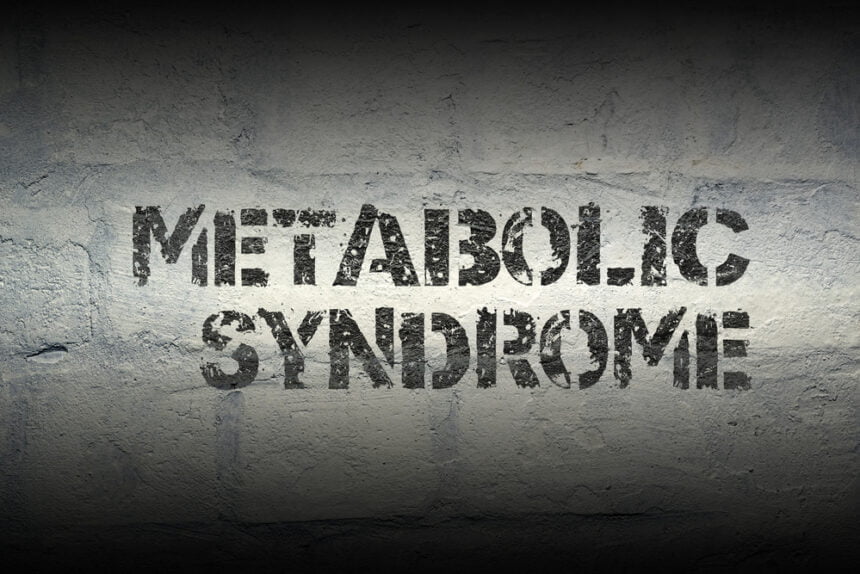There are many health problems plaguing Americans today, including obesity, diabetes, and heart disease – but these conditions don’t exist in a bubble. In fact, all of these issues are closely linked with something called metabolic syndrome. Unfortunately, while diabetes, obesity, and heart disease are all well-known issues, metabolic syndrome is grossly overlooked by the medical establishment.
As healthcare providers, we should pay more attention to manifestations of metabolic syndrome and discuss its symptoms with our patients as a way to improve overall health outcomes. That starts with recognizing it ourselves.
Identifying Metabolic Syndrome
It is composed of five key features: high blood pressure, high triglycerides, low levels of HDL (good) cholesterol, high fasting blood pressure, and the accumulation of abdominal fat along the waistline, sometimes known as abdominal obesity. We regularly address these specific symptoms, particularly blood pressure and cholesterol, with patients, but what we fail to do is connect them with metabolic syndrome and its established dangers when talking to patients.
Even in the 1990s, when metabolic syndrome was being widely discussed, it was widely discussed only among doctors – particularly among endocrinologists. They coded for metabolic syndrome in patient histories and billing, but it wasn’t a meaningful diagnosis in the sense of something to be directly treated. So, the key, then and now, is to translate metabolic syndrome into something patients can understand and address in a preventative fashion.
Attention To Risk
One of the reasons that metabolic syndrome is so rarely addressed with patients is that its risks are, unfortunately, similar to its outcomes. Anyone who develops gestational diabetes or has a family history of type-2 diabetes is at a higher risk of metabolic syndrome. On the other hand, those with metabolic syndrome are more likely to develop type-2 diabetes.
A similar logic applies to cardiovascular disease. A history of cardiovascular disease creates a predisposition to metabolic syndrome, but it also increases the risk of cardiovascular disease.
Setting aside these risk factors, though, in which risk factor and consequence are nearly identical, we should be more attentive to native risk factors such as race and age, and preexisting conditions like polycystic ovary syndrome and non-alcoholic fatty liver disease. Because these are not also outcomes of metabolic syndrome, they can help guide our medical advice to patients.
Additionally, we’ve reached a point in the obesity epidemic when it may not actually be effective to speak about weight loss, at least not in that context. After all, in Mississippi, 34% of people are obese, but it’s unlikely they all have metabolic syndrome.
On the other hand, some individuals with metabolic syndrome may fall below the threshold for clinical obesity, yet suffer from abdominal obesity, which is a specific manifestation of metabolic syndrome. Highlighting this unique form of weight accumulation, then, and its potential outcomes, may be more likely to motivate patients toward behavioral change.
Effective Management Of Metabolic Syndrome
Beyond drawing attention to key patient risk factors, our job is to help patients reduce those risk factors wherever possible. There are several key pieces of advice, specifically behavioral changes that can help eliminate or minimize it.
One of the most effective ways of managing it is through exercise, particularly interval and resistance training. These fitness regimens can reduce triglyceride levels and total cholesterol, lead to weight gain, and stabilize glucose levels. Resistance training, specifically, can also increase lean body mass, improving the metabolism.
Patients with metabolic syndromes should also undergo regular blood sugar testing to monitor the development of insulin resistance. Insulin resistance is one of the leading indicators that they may develop type-2 diabetes, but by tracking insulin abnormalities, patients and doctors can work together to make behavioral changes and stop diabetes before it develops.
Finally, specific dietary changes can help improve the symptoms – even when they seem counterintuitive. The currently trendy ketogenic diet, high in protein and fat, is so effective in managing metabolic syndrome that those following the ketogenic diet without exercise show greater improvement than those who did 30 minutes or more of exercise three to five times per week. The key seems to be in the reduction of carbs, particularly sugars, that elevate triglycerides and destabilize blood pressure, but because it is less restrictive, it’s possible patients are also more likely to comply with this diet than with other dietary changes.
Because it is so closely tied to many of the major health issues of our time, we need to make it a focal point of healthcare, with the goal of helping patients make changes before metabolic syndrome becomes diabetes, cardiovascular disease, or another life-limiting condition. Fundamentally, this is a question of risk and of prevention – and an ounce of prevention is worth a pound of cure.









